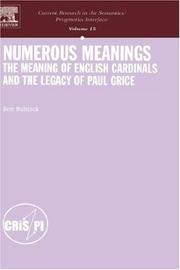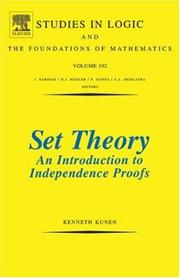| Listing 1 - 4 of 4 |
Sort by
|
Book
ISBN: 1281935492 9786611935498 9812795030 9789812795038 9781281935496 6611935495 Year: 2003 Publisher: River Edge, N.J. World Scientific
Abstract | Keywords | Export | Availability | Bookmark
 Loading...
Loading...Choose an application
- Reference Manager
- EndNote
- RefWorks (Direct export to RefWorks)
Reductionism is one of those philosophical myths that are either enthusiastically embraced or wholeheartedly rejected. And, like all other philosophical myths, it rarely gets serious consideration. Reasoning About Theoretical Entities strives to give reductionism its day in court, as it were, by explicitly developing several versions of the reductionist project and assessing their merits within the framework of modern symbolic logic. Not since the days of Carnap's Aufbau has reductionism received such close attention (albeit in a necessarily restricted and regimented setting such as that of mo
Cardinal numbers. --- Logic, Symbolic and mathematical. --- Reductionism. --- Philosophy --- Algebra of logic --- Logic, Universal --- Mathematical logic --- Symbolic and mathematical logic --- Symbolic logic --- Mathematics --- Algebra, Abstract --- Metamathematics --- Set theory --- Syllogism --- Arithmetic, Cardinal --- Cardinal arithmetic --- Cardinals (Numbers) --- Numbers, Cardinal --- Transfinite numbers

ISBN: 1280630175 9786610630172 0080456790 9780080456799 9780080445571 0080445578 0080445578 Year: 2005 Publisher: Amsterdam Elsevier
Abstract | Keywords | Export | Availability | Bookmark
 Loading...
Loading...Choose an application
- Reference Manager
- EndNote
- RefWorks (Direct export to RefWorks)
Outlandish as it may seem to the uninitiated, the meaning of English cardinal numbers has been the object of many heated and fascinating debates. Notwithstanding the numerous important objections that have been formulated in the last three decades, the (neo-)Gricean, scalar account is still the standard semantic description of numerals. In this book, Bultinck writes the history of this implicature-driven approach and demonstrates that it suffers from methodological insecurity and postulates highly non-conventional meanings of numerals as their "literal meaning", while it confuses the level of lexical semantics with that of utterances and cannot deal with a large number of counter-examples. Relying on the results of an extensive corpus-based analysis, an alternative account of the meaning of English cardinals and the ways in which their interpretation is influenced by other linguistic elements is presented. As such, this analysis constitutes a prism that offers todays linguist an iridescent history of one of the most fascinating, if often misconstrued, topics in contemporary meaning research: the conversational implicatures.
English language --- Cardinal numbers. --- Arithmetic, Cardinal --- Cardinal arithmetic --- Cardinals (Numbers) --- Numbers, Cardinal --- Set theory --- Transfinite numbers --- Numerals. --- Semantics. --- Semasiology --- Nominals --- Grice, H. P. --- Grice, Paul --- Cardinal numbers --- 802.0-56 --- 802.0-56 Engels: syntaxis; semantiek --- Engels: syntaxis; semantiek --- Numerals --- Semantics --- Lexicology. Semantics --- Grice, H. Paul --- English language Semantics --- Germanic languages
Book
ISBN: 1282714880 9786612714887 3110220350 9783110220353 9783110220346 3110220342 Year: 2010 Publisher: Berlin Mouton de Gruyter
Abstract | Keywords | Export | Availability | Bookmark
 Loading...
Loading...Choose an application
- Reference Manager
- EndNote
- RefWorks (Direct export to RefWorks)
The book embeds a description and an analysis of the Old English numeral system into a broader, cross-linguistic discussion. It provides a theoretical framework for the study of numerals and numeral systems of natural languages, bridging the gap between recent findings in the cognitive sciences on numeracy and the known typological generalisations on cardinal numerals. The Old English numeral system shows a number of peculiarities not found in the present-day languages of Europe. Its detailed description is therefore an ideal locus for studying the features of linguistic number expressions in terms of their morpho-syntactic properties and of the structure of numeral systems.The approach is innovative in that it combines a detailed analysis of the numeral system with the analysis of the grammatical properties of cardinal numerals. For the description of Old English, the study focuses on aspects of information structure and of referent identification in quantificational constructions. This leads to a novel perspective on the language-internal variation in the agreement patterns between numerals and quantified nouns, allowing the author to test and refine some long standing tenets in the study of numerals and to offer alternative explanations. Rather than seeing numerals as a hybrid word class, the author argues that this variation in the morpho-syntactic behaviour follows identifiable patterns specific to the word class numeral. He accounts for these patterns by positing different, cross-linguistically uniform stages in the emergence of numeral systems, as well as varying degrees of discreteness of the quantified noun. Moreover, the author demonstrates that the constraints determining this variation in Old English have obvious parallels across languages.
English language --- Cardinal numbers. --- Numeration. --- Comparative linguistics. --- Historical linguistics. --- Diachronic linguistics --- Dynamic linguistics --- Evolutionary linguistics --- Language and languages --- Language and history --- Linguistics --- Comparative philology --- Philology, Comparative --- Historical linguistics --- Number theory --- Arithmetic, Cardinal --- Cardinal arithmetic --- Cardinals (Numbers) --- Numbers, Cardinal --- Set theory --- Transfinite numbers --- Germanic languages --- Numerals. --- History --- Cardinal numbers --- Comparative linguistics --- Numeration --- Numerals --- Grammar --- anno 500-1199 --- English /Language. --- Historical Linguistics.

ISBN: 0720422728 9780080954837 0080954839 9780080955025 0080955029 9780080954868 0080954863 1283525607 9781283525602 9786613838056 6613838055 9780080955087 0080955088 9780080570587 0080570585 9780444104779 0444104771 0720422000 9780720422726 9780720422009 9780444105356 0444105352 0720422795 9780720422795 9780444854018 0444854010 0444868399 9780444868398 0444851631 9780444851635 9786613837998 1283525542 9786613837868 1283525410 Year: 1974 Volume: v. 76 Publisher: Amsterdam : New York : North-Holland Pub. Co. ; American Elsevier Pub. Co.,
Abstract | Keywords | Export | Availability | Bookmark
 Loading...
Loading...Choose an application
- Reference Manager
- EndNote
- RefWorks (Direct export to RefWorks)
Provability, Computability and Reflection
Mathematical logic --- Algebraic logic --- Logique algébrique --- Algebra, Boolean --- Boole, Algèbre de --- Cylindric algebras --- Algèbres cylindriques. --- Set theory. --- Cardinal numbers. --- Arithmetic, Cardinal --- Cardinal arithmetic --- Cardinals (Numbers) --- Numbers, Cardinal --- Set theory --- Transfinite numbers --- Aggregates --- Classes (Mathematics) --- Ensembles (Mathematics) --- Mathematical sets --- Sets (Mathematics) --- Theory of sets --- Logic, Symbolic and mathematical --- Mathematics --- 510.22 --- 510.22 Set theory. Set theoretic approach. Theory of order types, of ordinal and cardinal numbers --- Set theory. Set theoretic approach. Theory of order types, of ordinal and cardinal numbers --- 510.64 --- 510.64 Non-classical, formal systems of logic. Modal logic. Multiple-value logics. Syllogistics. Inductive logic. Probabilistic logic --- Non-classical, formal systems of logic. Modal logic. Multiple-value logics. Syllogistics. Inductive logic. Probabilistic logic --- Recursion theory --- 510.6 --- 510.6 Mathematical logic --- Congresses --- Axiomatic set theory --- Axioms --- Congresses. --- Proof theory --- Logique algébrique --- Théorie de la preuve --- ELSEVIER-B EPUB-LIV-FT --- Cardinal numbers --- Théorie des ensembles --- Nombres cardinaux --- Théorie de la récursivité --- Congrès --- Théorie axiomatique des ensembles --- Axiomatic set theory. --- Logique mathématique. --- Récursivité, Théorie de la. --- Recursion theory - Congresses --- Numbers, cardinals --- Théorie des ensembles --- Logic, Symbolic and mathematical -- Periodicals. --- Logic, Symbolic and mathematical. --- Recursion theory - Congresses. --- Recursion theory -- Congresses. --- Physical Sciences & Mathematics --- Mathematical Theory --- Algebraic logic. --- Proof theory.
| Listing 1 - 4 of 4 |
Sort by
|

 Search
Search Feedback
Feedback About UniCat
About UniCat  Help
Help News
News